
A common misconception about installing a solar panel system during the monsoon is that it won’t generate the required units of electricity to maintain the constant flow of electricity needed in your home. Other misconceptions include that the foundation of the mounting structure will rust fast and become weak or the panels will get damaged during heavy rainfall.
However, installing a solar panel system during monsoons is possible, and even sensible. Here are a few reasons why.
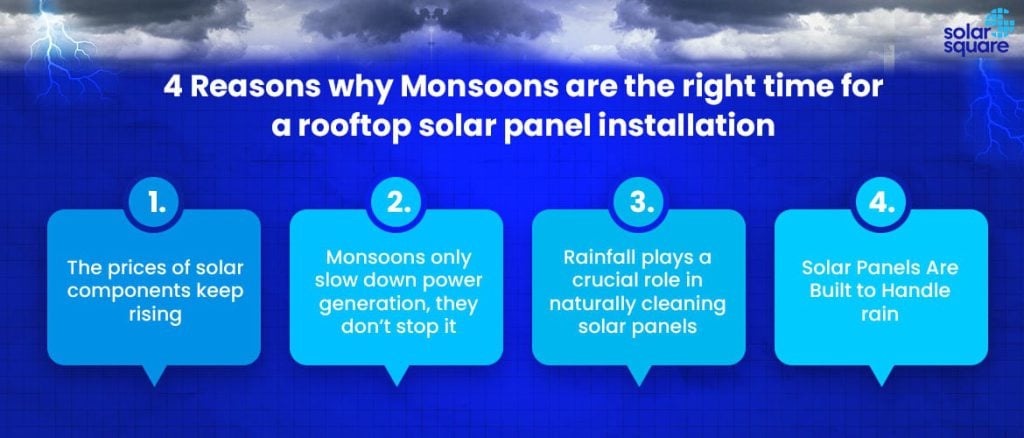
The prices of solar components keep rising
The prices of solar components may increase over time. The sooner you act, the more you save – on equipment and energy bills!
Monsoons only slow down power generation, they don’t stop it
A solar panel generates at least 7-8 units of electricity on a sunny day. However, on cloudy and rainy days, solar panels can still generate electricity from diffuse sunlight. While the efficiency is lower compared to sunny days, the panels are not entirely inactive.
Regularly maintaining and cleaning your solar panels can help boost the electricity generation capacity.
Rainfall plays a crucial role in naturally cleaning solar panels
Rainfall naturally tackles dirt build-up on solar panels. However, this is just surface-level cleaning and maintenance. You need to partner with a solar company that offers solar panel maintenance services that guarantee timely debris removal.
Solar Panels Are Built to Handle rain
Solar panels are designed to withstand various weather conditions, including rain. They are built with durable, waterproof materials, robust frames, and high IP ratings to resist water ingress.
Proper installation and regular maintenance ensure long-term durability and performance. Advanced monitoring and warranties from reputable manufacturers further guarantee their resilience in rainy conditions.
Maintaining your solar panels during the monsoon season
Regular professional cleaning and maintenance, as scheduled with your solar panel maintenance partner, are essential. The process includes the following steps.
- Consistently monitor the system’s output. Significant variations from the average during rainy days should be investigated promptly.
- During stormy weather, have your installer frequently inspect the area for any damage, loose connections, or debris accumulation.
- Ensure no nearby branches or trees obstruct sunlight from reaching the panels. Trim or prune them to maintain clear access to the sun’s rays.
Tips to ensure solar panel system safety during the monsoon season
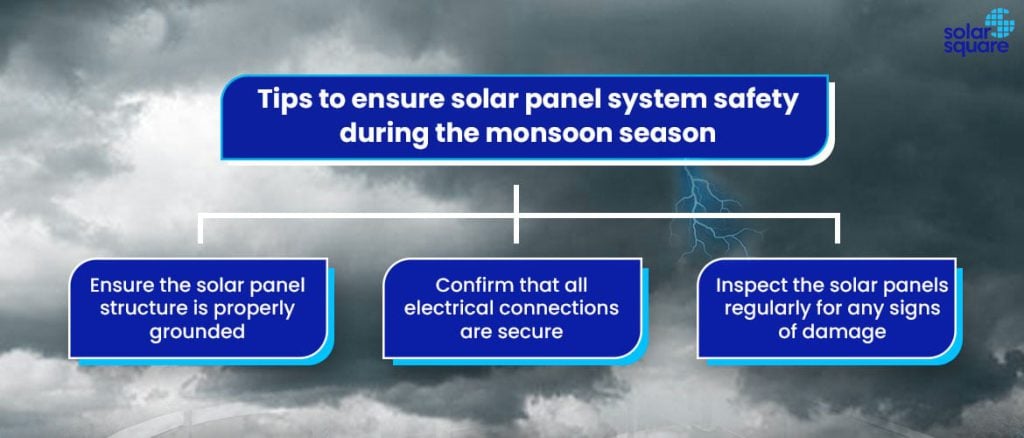
Safety measures aren’t necessary if you’ve installed the right premium-quality solar panel system on your rooftop. However, you can take the following precautions. These tips largely depend on your solar panel maintenance partner and routine.
- Ensure the solar panel structure is properly grounded.
- Confirm that all electrical connections and components are secure to prevent water from entering.
- Inspect the solar panels regularly for any signs of damage, such as cracks or loose screws.
Get monsoon-ready, storm-proof, surakshit, solar panel systems with SolarSquare
Maybe, you’ve seen solar systems fly off during the monsoon season, or get damaged or simply shut down due to a heavy downpour. However, you will witness the true power of a rooftop solar system with sahi solar like the one designed and built specifically to weather storms and stand tall during the relentless monsoon.

Pre-fabricated & Ready to Install Solar Solutions
Our solar panels are pre-fabricated and ready to install, eliminating the risk of manual errors on-site. The aerodynamically engineered structure is custom-designed to withstand wind speeds up to 180 km/h and has been approved by IIT Bombay as cyclone-proof.
The installation follows the Japanese Poka-Yoke fault-free method, ensuring precision and reliability. Our panels are 100% rust-proof with a 5-year warranty, made from virgin steel by JW, Essar, and TATA Steel, and feature an HDGI 80-micron rust-free coating.
360° Power Boost Maintenance Plan
Our comprehensive 360° Power Boost Maintenance plan ensures your solar system will receive premium care for the next five years. The plan includes:
- Preventive Maintenance: Conducted by trained technicians every 90 days (four times a year).
- Corrective Maintenance: On-call break-down service as needed.
- Module Deep Cleaning: Essential for optimal performance, done every 15 days (20 times a year).
The deep cleaning services involve advanced equipment to maximise sunlight absorption and energy production. We guarantee a minimum of 45 PowerBoost visits over five years, with at least 45 visits for thorough inspections, cleanings, and necessary adjustments to consistently enhance your solar panel’s power output.
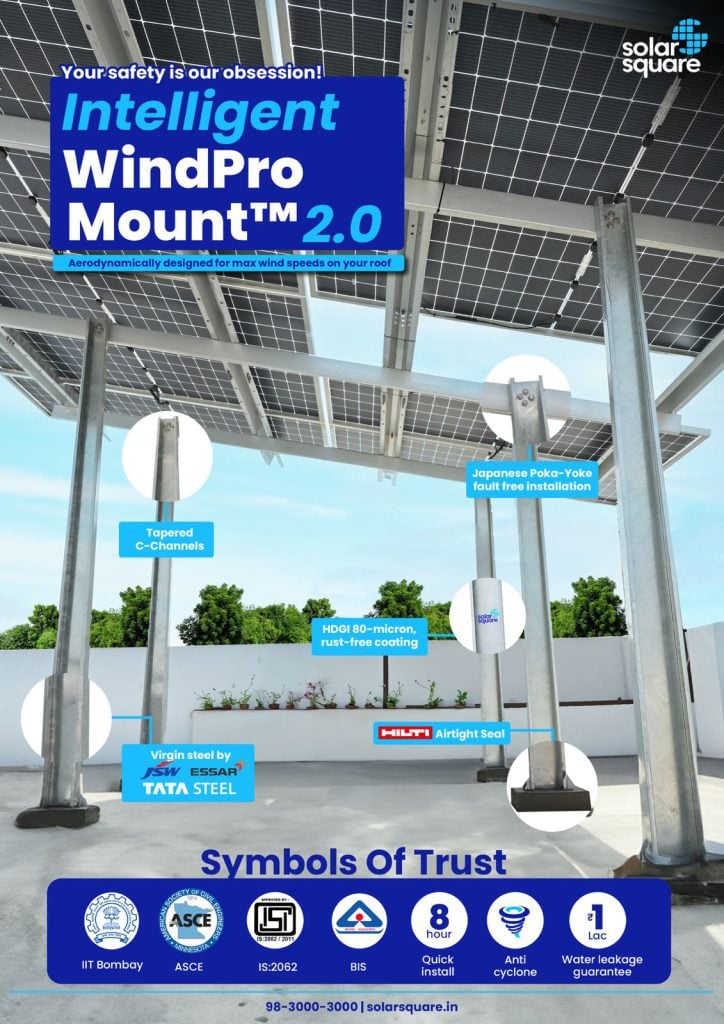
Ensuring Optimal Performance and Peace of Mind
We offer five years of free maintenance, so you don’t have to worry about upkeep costs or scheduling appointments. Our comprehensive inspections include:
- Electrical Inspection: Regular tests and checks to ensure safety and functionality, preventing potential issues.
- Structural Inspection: Assessment of the physical structure supporting your solar panels to ensure strength and security in any weather.
- Mechanical Inspection: Thoroughly examine all mechanical parts to ensure smooth operation and longevity.
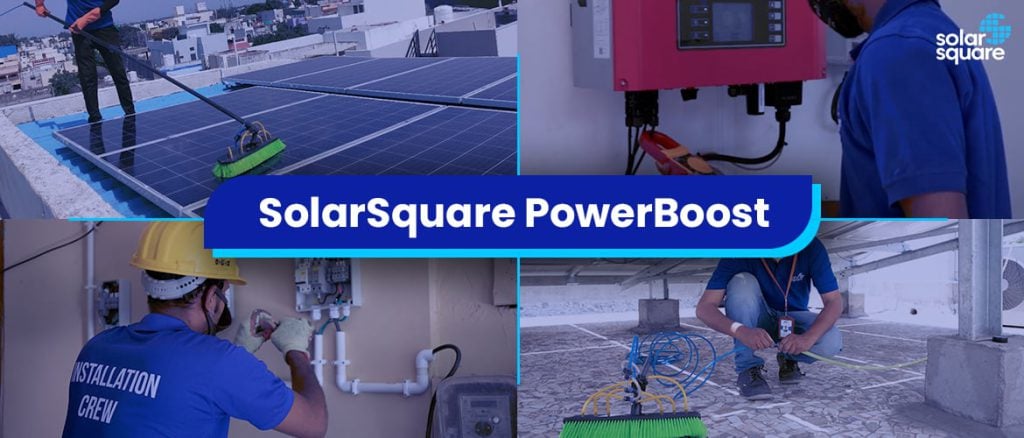
Make the switch towards sahi maintained solar – contact us today.
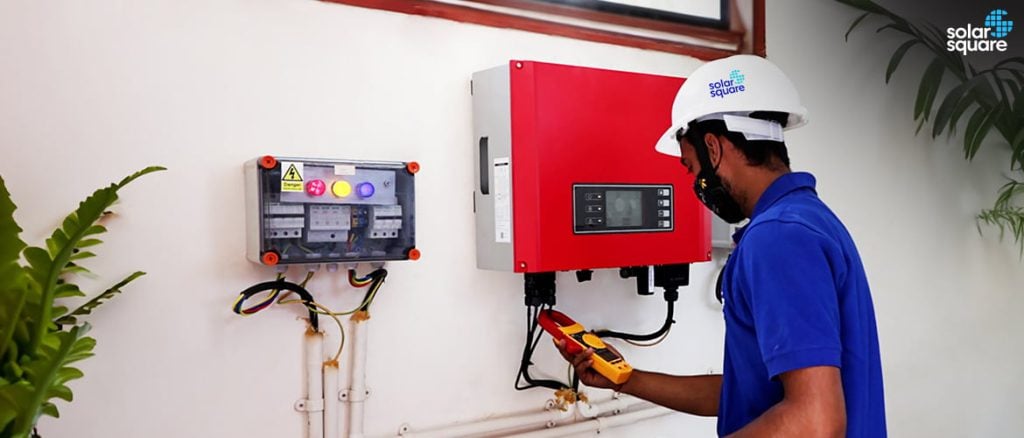
FAQs
Q1. Will my solar panel system generate power when there is no sun and only rain?
Ans. Yes! Even during rainy days, plenty of diffuse sunlight allows solar panels to generate electricity.
Q2. Will rain damage the solar panels?
Ans. No! Solar panels are built with materials designed to protect against rainwater from entering. Additionally, rain helps clean the panels, improving their efficiency.
Q3. What about rusting and corrosion of the solar panel structure during heavy rains?
Ans. Most solar panel structures are prone to rust over time. However, SolarSquare’s Intelligent WindPro MountTM 2.0 uses virgin steel from reputable brands like JSW, Essar, and Tata, and features an HDGI 80-micron rust-free coating to prevent rust and corrosion.
Q4. Is it cheaper to install solar panels during the monsoon season?
Ans. This can vary depending on the vendor. Check with your vendor for any monsoon offers or discounts that may be available.
Q5. Does rain help maintain the solar panels?
Ans. Rain provides surface-level cleaning but does not offer the comprehensive maintenance required to ensure optimal performance. Regular professional maintenance is still necessary.
Q6. How does the monsoon affect the installation timeline?
Ans. Heavy rains can potentially delay the installation process. Generally, solar panel installation and commissioning take 30 days minimum, considering the time needed for subsidy approvals, loan processing, and other factors.
Q7. Is there any production loss of solar panels during the monsoon season?
Ans. There may be a production loss of about 10-20%, but solar panels will continue to generate electricity as usual.
